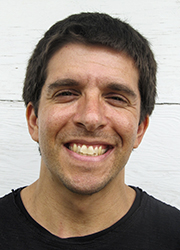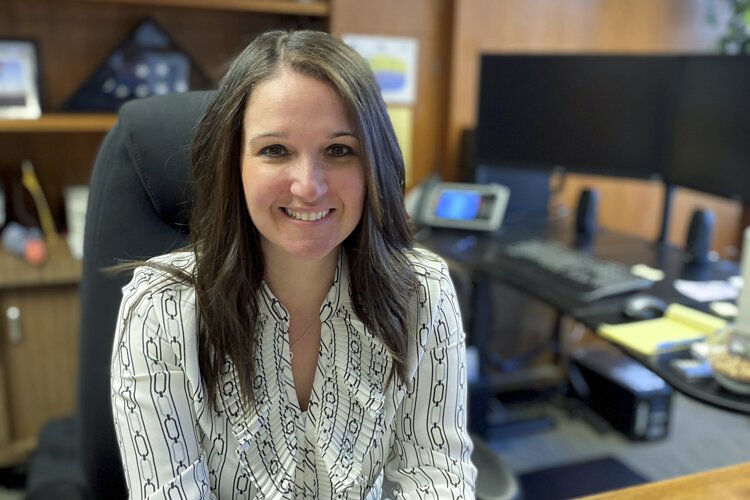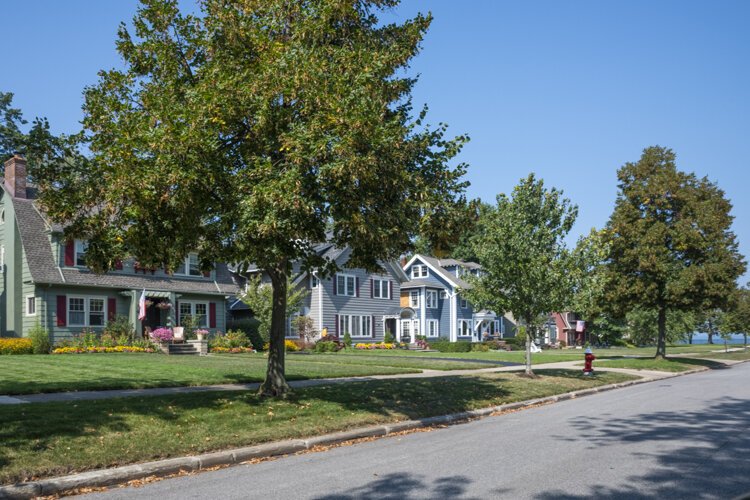Changing course: Newly minted suburban mayors chart new territory during pandemic
This is the latest story in FreshWater Cleveland's series First Suburbs: A Closer Look, focusing on the suburbs surrounding Cleveland. Built mostly before the 1960s, these “first” suburbs face challenges ranging from urban sprawl to disinvestment. But shrinking news coverage reports mostly on crime. This series instead will look at the unheralded people and innovative programs that are making a difference, through a solutions-based journalism lens.
 Fairview Park Mayor Patrick Cooney (center) with auxiliary policeFairview Park Mayor Patrick Cooney took office on Jan. 1, 2020, ready to guide the West Side suburb into a new decade. At 10 a.m. that morning, Cooney received a phone call from the fire chief that the power at City Hall had gone out.
Fairview Park Mayor Patrick Cooney (center) with auxiliary policeFairview Park Mayor Patrick Cooney took office on Jan. 1, 2020, ready to guide the West Side suburb into a new decade. At 10 a.m. that morning, Cooney received a phone call from the fire chief that the power at City Hall had gone out.
Although brief, the outage served as foreshadowing of a demanding year marked by epochal crisis and economic uncertainty.
For Cooney and newly minted Lakewood Mayor Meghan George, the coronavirus pandemic capsized their leadership expectations, even as managing a public health emergency made them stronger in the process.
“I had just started and didn’t know most of the people yet from the prior administration,” recalls Cooney. “I didn’t have that rapport yet, though in a pandemic, you have to sit down and talk through the minutiae [of leading a city].”
Cooney, 54, is an attorney who moved to Fairview Park three years ago. Formerly an assistant law director and police prosecutor in Garfield Heights, Cooney never had mayoral ambitions until approached by his fellow residents—among them, outgoing Mayor Eileen Ann Patton—about running for the position.
“I really enjoyed public service work,” says Cooney. “You can see the impact you have even on small matters, like getting rid of a bad landlord. The more I thought about becoming mayor, the more I thought I could be helpful to the community.”
Cooney arrived aiming to expand the city tax base, increase support for existing businesses, and improve infrastructure. Early on, the new mayor met with NASA and the Cleveland Clinic about potential collaborations—plans that by spring had quickly dissolved.
COVID-19 hit home in mid-March when a Fairview Park firefighter tested positive for the deadly virus. Cooney conferred with county health officials on next steps, deciding to set up a makeshift fire station at the recently closed senior center. The postponed presidential primary election further illustrated the strange existence humanity had been thrust into.
“That’s when it hit—we were going to have to be constantly evaluating things,” says Cooney. “The ball kept moving and you didn’t know what shell it was under. You think you’ve got it figured out, then things totally change.”
 A police officer being sworn in by Mayor George.Dealing with the new normal
A police officer being sworn in by Mayor George.Dealing with the new normal
Mayor George, a third-generation Lakewood resident, took the big seat with experience as a city council representative. George follows the governing footsteps of her late father, Thomas, a four-term councilperson who also acted as Lakewood’s mayor from 2004 to 2007.
Only a few months into her first stretch as mayor, George was working in a nearly empty City Hall that had most of its 400 employees operating remotely. The pandemic required an immediate shift from normal procedures, with conversations beginning in February when the Chinese government tightened lockdowns in its own battle with coronavirus.
“I heard the city of Wuhan had shut down and I thought this was way bigger than any of us realized,” says George, 38. “Shutting down a city of 11 million people is no small feat.”
Cancellations in Ohio’s densest suburb could not impede timely governance, George knew. In March, she assembled an internal taskforce, holding daily in-person meetings to discuss state orders and data reports. Virtual town halls keep city departments in touch today.
“We still need to run a city and make sure we’re addressing needs,” says George. “Putting together a taskforce was one of the most important and effective things I did early on.”
Economic distress naturally followed the health crisis, with Lakewood down around $4 million in revenue compared to 2019. A Small Business Relief Fund provided $3,000 in individual rent assistance for local companies—a recently released second round of the program allows for up to $7,000 in rent relief or payroll assistance. In the meantime, voluntary furloughs and reduced overtime has saved the city $700,000.
“I’m proud of the work this team has done to avoid mandatory layoffs or furloughs,” George says. “We’re committed to do everything we can to make sure Lakewood comes out of this in a successful position.”
 Fairview storefrontsMeanwhile, Fairview Park endured voluntary and involuntary layoffs in the pandemic’s first weeks. Most city employees have returned to work, while a microgrant program distributed $54,000 to local small businesses. A projected revenue loss of $800,000 fell well short of that mark, though Cooney remains concerned that unemployment among residents will negatively impact the city’s coffers next year.
Fairview storefrontsMeanwhile, Fairview Park endured voluntary and involuntary layoffs in the pandemic’s first weeks. Most city employees have returned to work, while a microgrant program distributed $54,000 to local small businesses. A projected revenue loss of $800,000 fell well short of that mark, though Cooney remains concerned that unemployment among residents will negatively impact the city’s coffers next year.
Online council meetings comprise Cooney’s current day-to-day agenda. Additional trials exacerbated by the pandemic have emerged, including heavy rains in May that flooded more than 15 homes.
“You don’t want to be too slow, or too fast, when dealing with people’s safety,” says Cooney. “We had to determine what kind of exposure our safety forces and service departments would have after the flood. The detail of it was challenging throughout all departments.”
Cooney spends his few moments of downtime with his wife, Sheila, and their three children. A new puppy keeps him busy at home, as does the occasional sweat-inducing bike ride. On the city leadership side, Cooney credits his employees at all levels for making the job a little easier.
“When [COVID-19] first started, nobody knew what we were dealing with, but people came in and worked hard every day,” says Cooney. “Everyone has been doing their work and that’s been great.”
Lakewood’s George, a golfer in her spare time, is also up for a relaxing walk in the Metroparks. The crisis marking her early tenure has sparked even more enthusiasm to serve the suburb she adores.
“For months, I was working 24/7, but you’ve got a job to do, and you have to get it done,” she says. “This community motivates me—it’s why I got into public service.”
The series is made possible through the support of Citizens Bank, the First Suburbs Consortium, and the First Ring Schools Collaborative.



